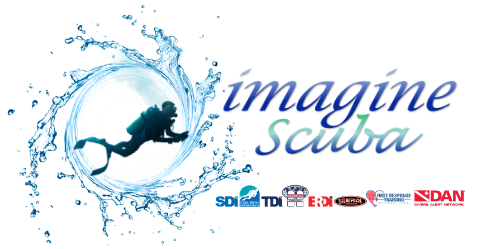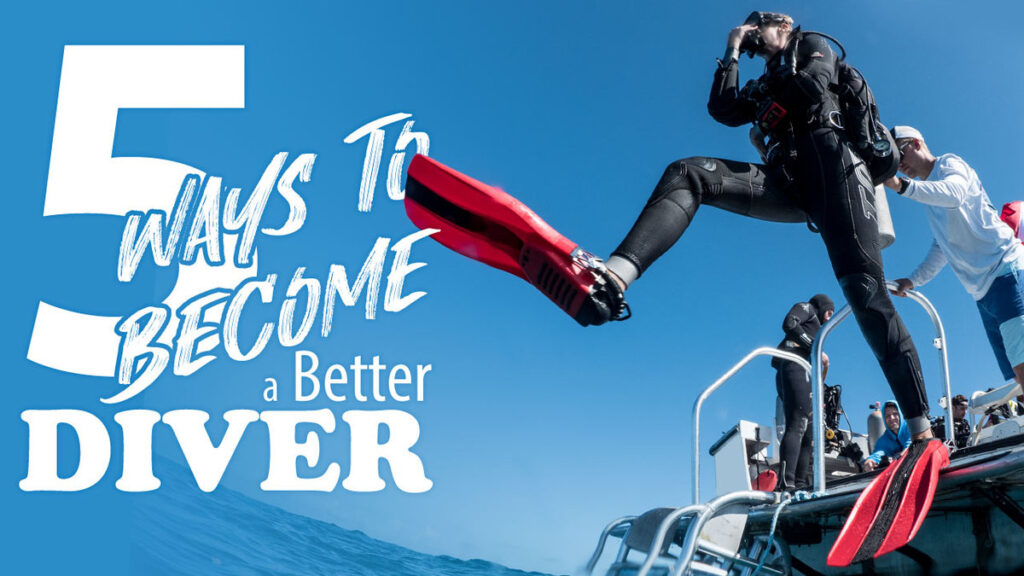Once you take up diving you soon realise that it is an activity rich in improvement potential. What you learn while getting certified is only a portion of the available knowledge and skills that you can acquire. If you’re interested in developing further as a diver without necessarily going down the professional route, these are five ways in which you can become better at this sport.
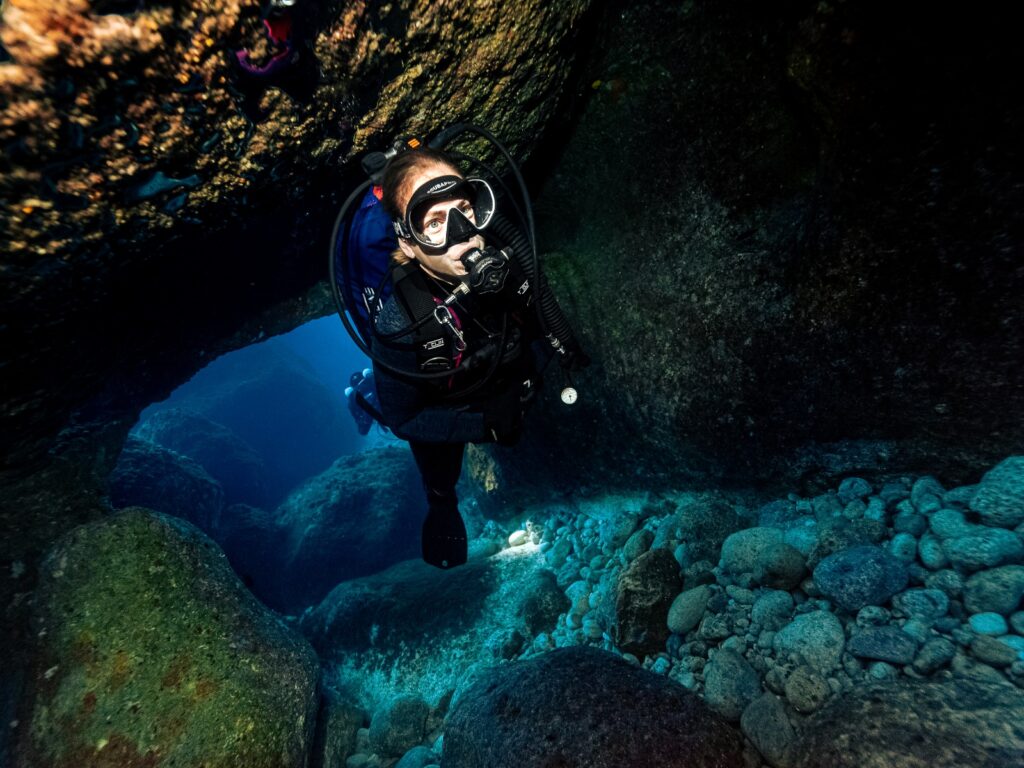
1. Dive, dive, dive
This might seem obvious but one of the best ways of developing your skills as a diver is to dive as often as you can. The number of years diving don’t really amount to much if you only dive on holiday once or twice a year. You could still be a relatively inexperienced diver despite having taken up the sport several years ago.
Similarly, the number of dives you have is only a partial indication of your level of experience; if most of your diving took place in ideal conditions and in the safety of a guided group then the quality of your experience is rather uniform. It lacks the variety of someone who has experienced poor visibility, adverse weather conditions when doing a boat dive, strong currents, tricky shore entrances, and cold water.
While it is imperative to dive within your comfort zone, it is unlikely that you will develop the kind of skills you require as a more seasoned diver if you never push yourself a bit further. Diving regularly and in different kinds of conditions allows you to rapidly develop the experience you require to master some of the skills you need to feel more confident as a diver.
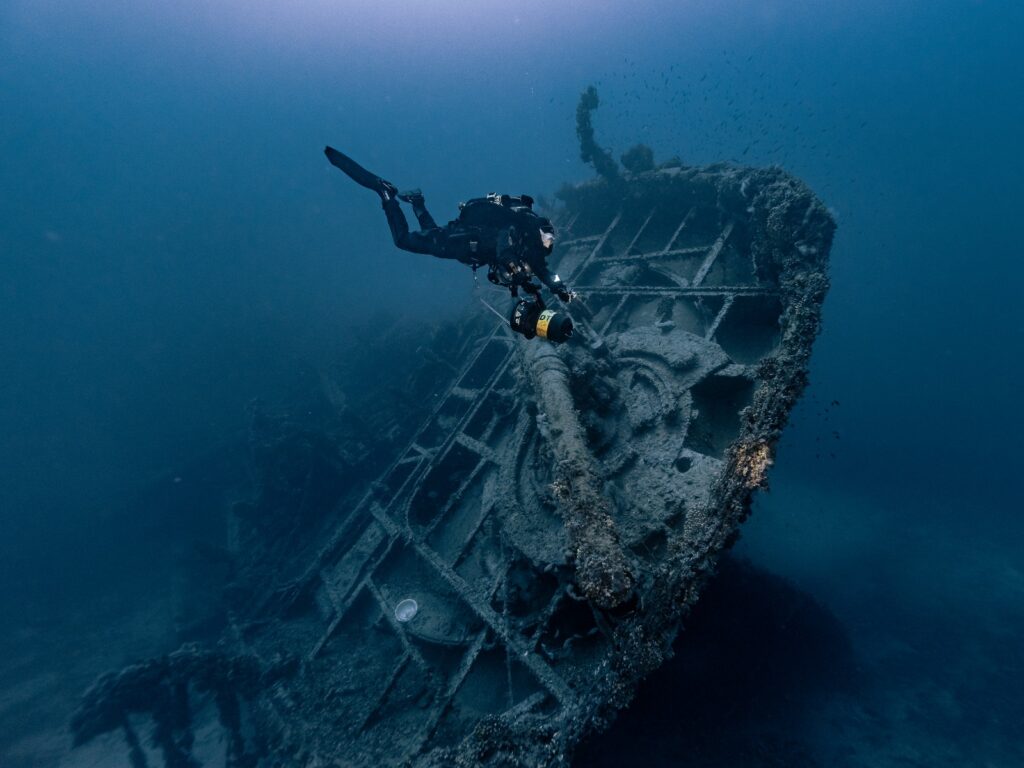
2. Learn as much as you can
Experience alone isn’t enough to make you a better diver. While you can learn a lot from different kinds of diving experiences, this isn’t a substitute for formally acquiring the knowledge, skills and dispositions that will enable you to be aware of certain limitations or to use more effective techniques. For example, someone who hasn’t taken their diving education beyond the open water level might be unfamiliar with different finning techniques, ways of navigating underwater, or assisting a diver in distress.
The easiest way of expanding your knowledge as a diver is to do different kinds of courses, from brief speciality courses to ones that introduce you to new kinds of diving. For instance, someone wishing to dive in non-tropical environments would benefit from learning how to use a dry suit safely by doing a speciality course rather than merely buying one and jumping into the water. Recreational divers who feel they are ready to extend the depths at which they dive would definitely learn why it is vital to have equipment redundancy and to use specialised techniques by enrolling on a technical diving course. Relying on one’s experience alone in such cases can result in potentially fatal consequences.
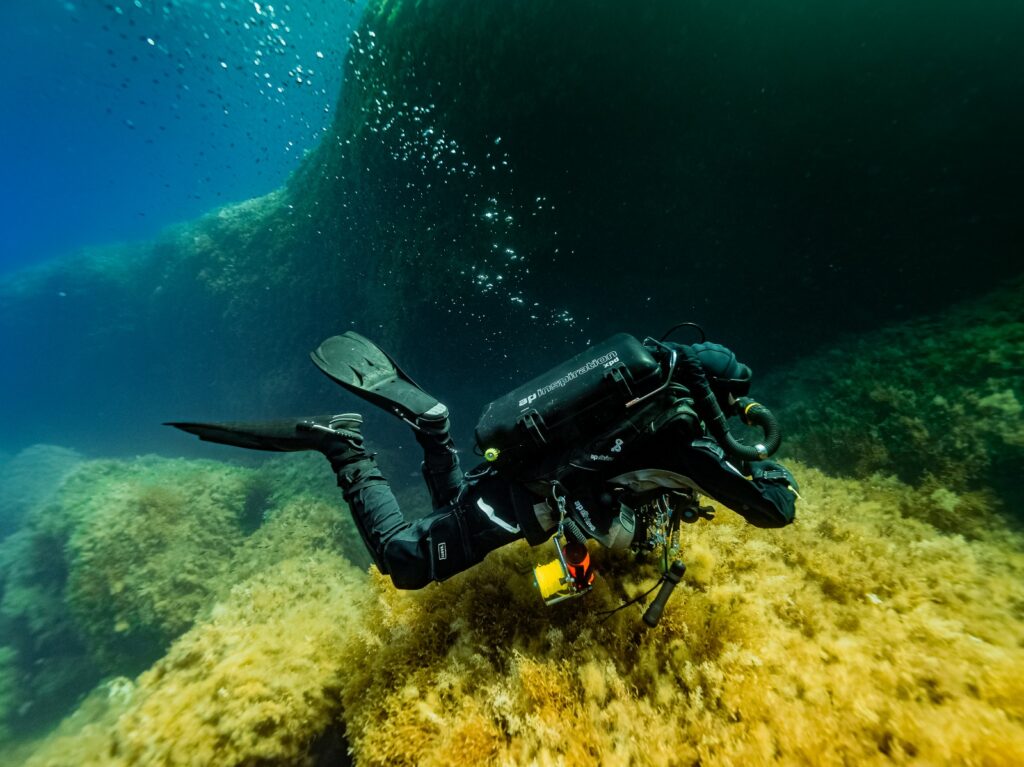
3. Join a club
A good way of honing your skills as a diver and learning more about the sport is by becoming part of your local diving community. Diving clubs exist in many countries and while some of them are highly specialised (e.g., cave diving or deep wreck diving), others welcome divers with a broad range of abilities and interests.
For instance, the club I belong to (ATLAM Subaqua Club) is led by highly experienced rebreather divers who have created a well-knit community of technical divers. However, the club still makes it a point to organise a recreational boat dive once a week that is open to all certified divers. Members of the club get to dive with and learn from people with varying degrees of experience.
Besides being a great way of socialising with people who share your passion, joining a club is also a means by which you can wean yourself off the sense of dependence that many novice divers have on instructor-led dives. If you feel ready to start diving with a group of friends but don’t yet know enough experienced divers, you might want to join a diving club or look for similar communities of divers in your area.
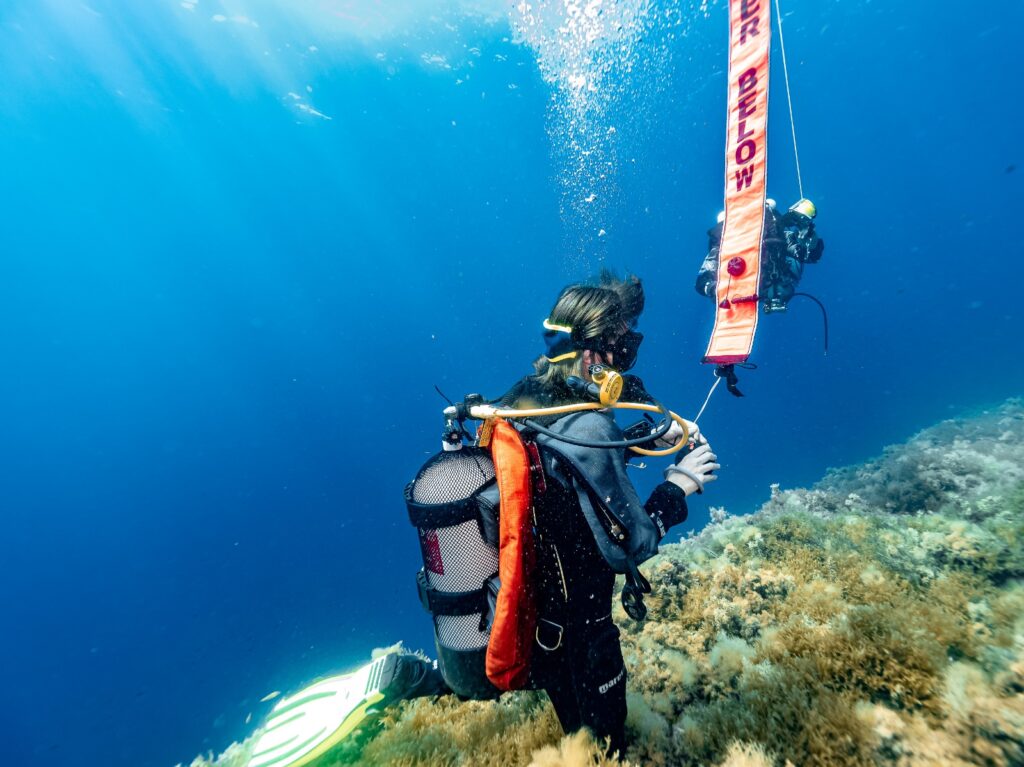
4. Lead and follow
Once you start diving with different kinds of people and developing your skills further, it is important to avoid being someone who always follows the more seasoned divers in the group. While those divers can teach you a lot about technique, conditions and dive sites, the knowledge you accumulate should also give you the confidence to take a more leading role during certain dives. For instance, if there’s a shore dive that you’ve done many times but have always relied on someone else to lead, maybe it’s now time to exercise your dive planning and navigation skills more fully by adopting a central role in the dive.
Diving with more experienced people is highly instructional, but so is diving with a less experienced buddy. This doesn’t mean that you’re putting yourself in the position of a qualified instructor. However, some of your friends might have less knowledge and experience than you and on certain occasions they might benefit from what you can offer if you develop the confidence to share it with them. Striking a balance between leading and following enables you to become a more competent diver because you develop an appreciation for learning from all kinds of diving situations.
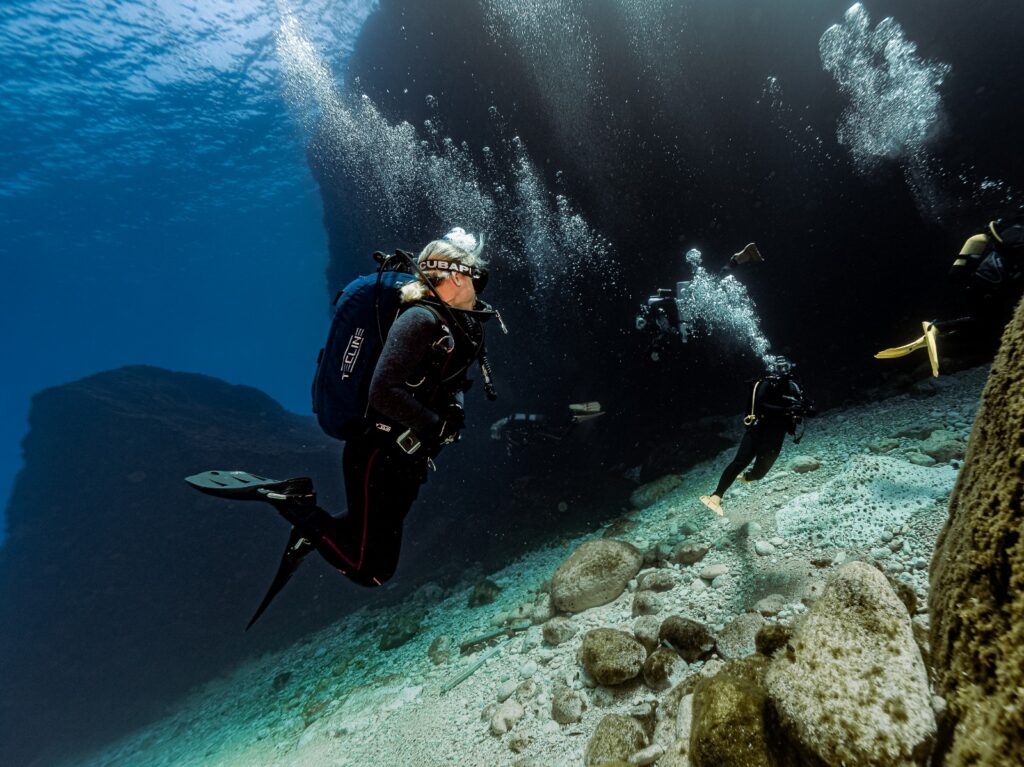
5. Seek feedback
One of the most effective ways of reviewing your performance as a diver is to be open to the feedback that others can provide you with. While feedback is a cornerstone of diving education and instructors are meant to help trainees to evaluate the positive aspects of their performance as well as those areas that require further consolidation, feedback should be something that you remain receptive to long after you complete initial certification courses.
If you continue your diving education, you will receive further feedback on your performance and this can lead you to enhance your ability to execute both new and foundational techniques. However, feedback isn’t only part of formal diving education. If you regularly dive with a buddy or a group of friends whose opinion you trust and respect, you can devise ways of evaluating a dive so that each one of you learns about what went well and what could be done better.
The main risks associated with the feedback process consist of mistaking it for the need to criticise someone or the act of giving advice to those who haven’t asked for it. If you are interested in improving your performance via feedback, you are likely to ask someone for it and to expect a constructive review.
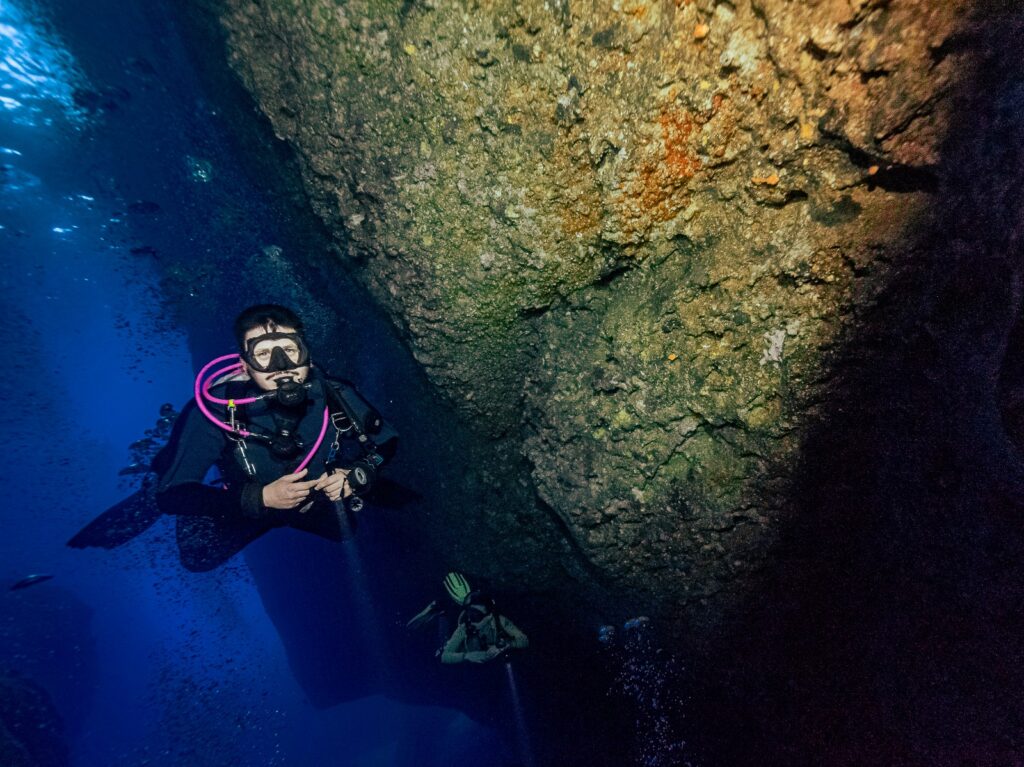
Bonus tip: Stay humble
When some divers gain a lot of experience and become highly competent, the temptation to sneer at those who aren’t yet at their level is very high. They seem to forget their own starting point and how long it took them to achieve perfect trim or an excellent air consumption rate. Even if you are a natural and progress very quickly to become an excellent diver, you must never lose sight of the fact that arrogance isn’t going to make people think more highly of you as a diver.
Some of the divers I admire the most are exceptionally skilled and yet incredibly humble. They make you feel that the sport you love is inclusive rather than elitist, and that what they know and can do is something you can acquire too. Moreover, their humility has also stopped them from becoming over-confident and averse to safety rules. It’s as if they have taken to heart the popular saying, ‘There are old divers and bold divers, but there are no old bold divers.’ They lead by example and make you realise that staying humble not only enables you to keep learning but even allows you to enjoy the sport safely.
By Daniel Xerri
Daniel Xerri is a trimix diver based in Malta. He holds a PhD in Education and works as a university lecturer and researcher. Follow him on Instagram @daniel.xerri
